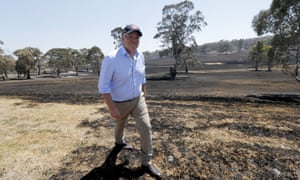Newspoll shows eight-point drop in prime minister’s favourability
rating after widespread criticism of his handling of the bushfires
Scott Morrison has suffered a massive hit to his personal approval rating and been overtaken as preferred prime minister by Anthony Albanese in the first published opinion poll of 2020.
The Newspoll, published on Monday, confirms that a horror summer in which Morrison chose to holiday in Hawaii during the extended bushfire crisis that has claimed 28 lives and more than 2,000 homes, and fumbled meetings with victims, has significantly impacted his popularity.
The poll of 1,505 voters, conducted between Wednesday and Saturday, found more voters (59%) are dissatisfied with Morrison’s performance than satisfied (37%).
Satisfaction in Morrison fell eight points and dissatisfaction
increased by 11 points, both movements outside the poll’s margin of
error of 2.5%. Just 4% of voters were “uncommitted” when asked how
Morrison is performing.The Newspoll, published on Monday, confirms that a horror summer in which Morrison chose to holiday in Hawaii during the extended bushfire crisis that has claimed 28 lives and more than 2,000 homes, and fumbled meetings with victims, has significantly impacted his popularity.
The poll of 1,505 voters, conducted between Wednesday and Saturday, found more voters (59%) are dissatisfied with Morrison’s performance than satisfied (37%).
Albanese is in positive territory after a six-point increase in satisfaction from 40% to 46% and dissatisfaction falling from 41% to 37%.
He leads Morrison as preferred prime minister, 43% to 39%, the first time he has done so since taking the Labor leadership after Bill Shorten’s shock loss at the May 2019 election.
Morrison dropped nine points as preferred prime minister while Albanese increased by nine points, reversing Morrison’s lead of 14 points in the last poll, taken in the first week of December, to trail by four points.
The Coalition suffered a two-point drop in primary vote to 40% while Labor recovered by three points to 36%. In two-party-preferred terms Labor lead the Coalition 51% to 49%.
The pollster Kevin Bonham said Morrison’s plunge from 14 points ahead as preferred prime minister to four behind is “the equal second highest such loss in Newspoll history”, after Paul Keating’s 23% drop against John Hewson after the horror 1993 budget.
He also said it was “highly unusual” for the current prime minister to trail the opposition leader on preferred prime minister when the two-party-preferred margin was narrow.
Since returning to Australia days before Christmas Morrison has apologised for his holiday and ramped up the federal government’s response to the bushfire crisis but denied suggestions it has been slow to respond or that Australia’s response to global heating is plainly inadequate.
In the first week of January the federal government issued a compulsory callout of 3,000 defence force reserves and Morrison pledged $2bn for bushfire recovery.
But Morrison’s horror summer – in which he was heckled by survivors in Cobargo, New South Wales – continued with the revelation that the NSW Rural Fire Service commissioner had not been informed of the compulsory callout and an embarrassing gaffe in which Morrison claimed nobody had died on Kangaroo Island where, in fact, two people were killed.
On Sunday Morrison acknowledged that he “could have handled on the ground much better” in the “strained” emotional environment of firegrounds.
He suggested he would seek authority from the states and pass new legislation for the chief of the defence force to take a more proactive role in deploying defence personnel during natural disasters, which are normally managed by the states, describing the public expectation of a bigger federal response as the “new normal”.
Morrison indicated that the government could bolster its carbon emission reduction efforts and flagged a royal commission into Australia’s horror bushfire season.
Doubts have been raised about the Australian government’s ability to meet its Paris targets of 26% to 28% emissions reduction by 2030, with the use of carryover credits criticised as an “accounting trick” that may add up to as much as 80% of Australia’s emission reduction achievement.
The former head of Morrison’s department, Martin Parkinson, has blamed “civil war” within the Coalition for the government not developing a more ambitious climate policy, warning that global efforts were insufficient to halt warming at 2C.

No comments:
Post a Comment